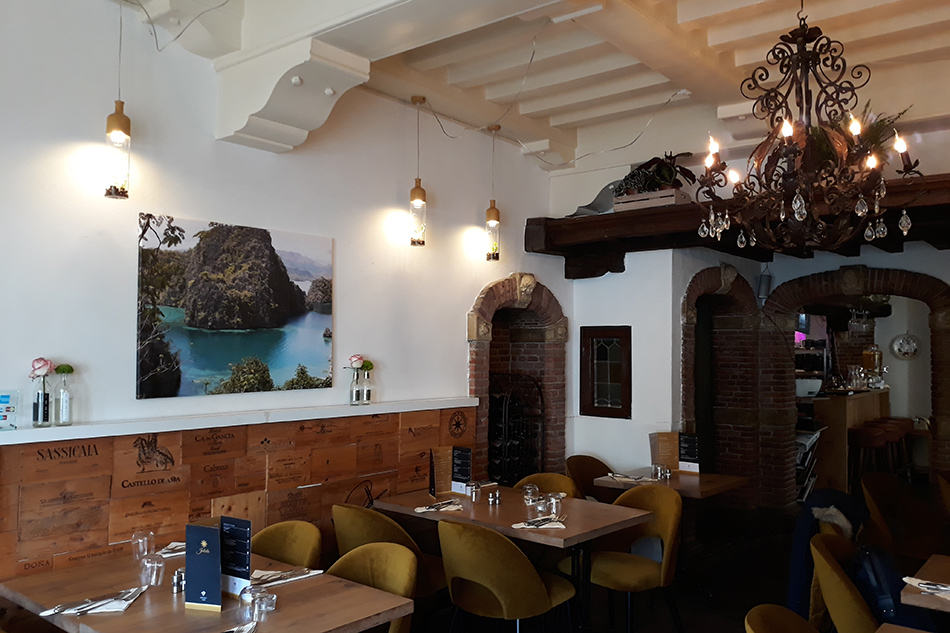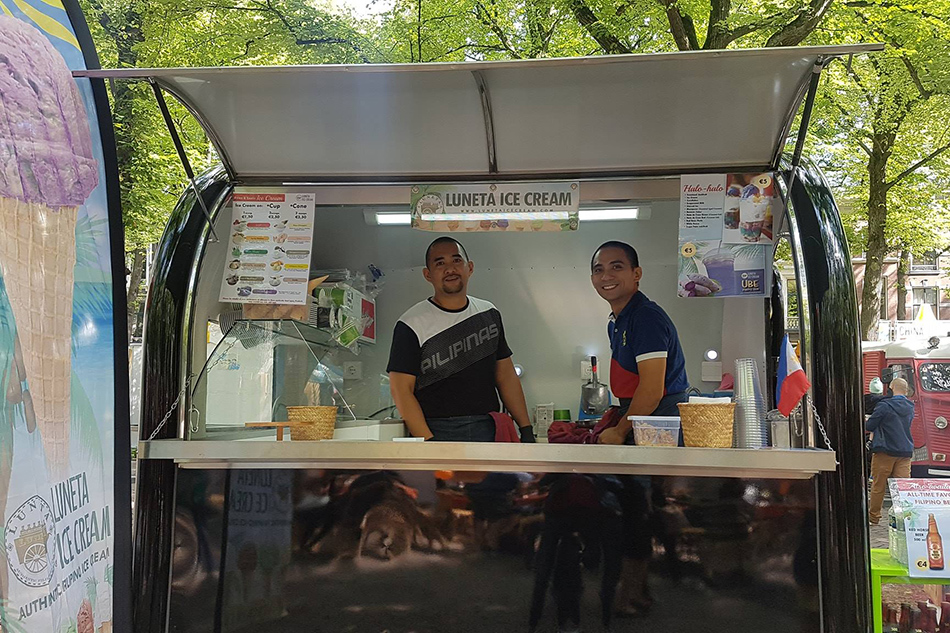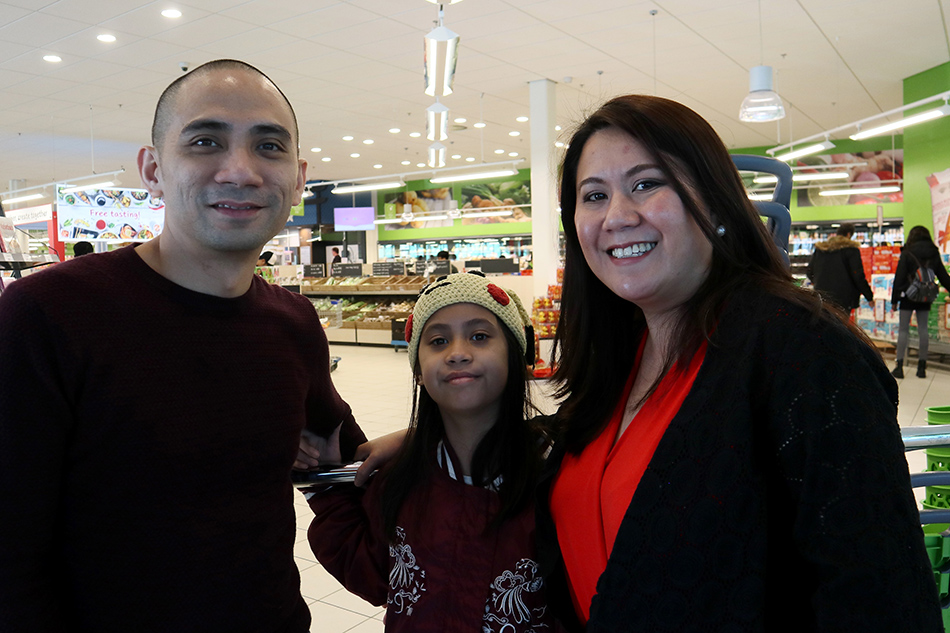Filipino businesses in Netherlands face challenges despite relaxed COVID-19 measures | ABS-CBN
ADVERTISEMENT

Welcome, Kapamilya! We use cookies to improve your browsing experience. Continuing to use this site means you agree to our use of cookies. Tell me more!
Filipino businesses in Netherlands face challenges despite relaxed COVID-19 measures
Filipino businesses in Netherlands face challenges despite relaxed COVID-19 measures
Jofelle Tesorio,
ABS-CBN News
Published Jun 29, 2020 05:42 PM PHT
THE HAGUE, Netherlands - Creativity and resilience have kept small Filipino-owned businesses in the Netherlands afloat but challenges abound even after the COVID-19 measures have been eased.
Starting June 1, restaurants and other establishments have been allowed to open with a maximum of 30 customers inside, while terraces can be opened without limit.
THE HAGUE, Netherlands - Creativity and resilience have kept small Filipino-owned businesses in the Netherlands afloat but challenges abound even after the COVID-19 measures have been eased.
Starting June 1, restaurants and other establishments have been allowed to open with a maximum of 30 customers inside, while terraces can be opened without limit.
From July 1, people can be allowed inside restaurants, cinemas, and museums as long as the physical distancing of 1.5 meters and other hygiene protocols are followed.
From July 1, people can be allowed inside restaurants, cinemas, and museums as long as the physical distancing of 1.5 meters and other hygiene protocols are followed.
According to Vivienne Tautho Knol-Tinapay, owner of Baryo Pilipinas in the center of The Hague, when her restaurant closed for dine-in on March 16, she relied on takeaways and deliveries. But her income was not much since potential customers preferred to stay home.
According to Vivienne Tautho Knol-Tinapay, owner of Baryo Pilipinas in the center of The Hague, when her restaurant closed for dine-in on March 16, she relied on takeaways and deliveries. But her income was not much since potential customers preferred to stay home.
She started to offer affordable small-order quick meals like siopao, siomai, pansit (stir-fry noodles), rice toppings, desserts, bread, and halo-halo (fruits with crushed ice and milk) this summer.
“Nahirapan pa rin kami kahit may tulong ang gobyerno (We are still struggling despite the assistance from the government),” Knol-Tinapay said, referring to the three-month subsidy for salaries of staff that the Dutch government extended. There was, however, no reprieve from rent in a prime location next to the city hall building.
She started to offer affordable small-order quick meals like siopao, siomai, pansit (stir-fry noodles), rice toppings, desserts, bread, and halo-halo (fruits with crushed ice and milk) this summer.
“Nahirapan pa rin kami kahit may tulong ang gobyerno (We are still struggling despite the assistance from the government),” Knol-Tinapay said, referring to the three-month subsidy for salaries of staff that the Dutch government extended. There was, however, no reprieve from rent in a prime location next to the city hall building.
ADVERTISEMENT
Knol-Tinapay’s family restaurant has six staff, of whom, two are full-time. She had to ask them to work fewer hours since the restaurant has been operating minimally.
Knol-Tinapay’s family restaurant has six staff, of whom, two are full-time. She had to ask them to work fewer hours since the restaurant has been operating minimally.
She is hoping that during the summer, patrons will come back so they can continue the recovery.
She is hoping that during the summer, patrons will come back so they can continue the recovery.
For Zachary John Estrada Velasco, owner of Julieta, a Filipino-European fusion restaurant, deliveries became their lifeline during the lockdown.
For Zachary John Estrada Velasco, owner of Julieta, a Filipino-European fusion restaurant, deliveries became their lifeline during the lockdown.
“Our rent continues so we have to find another way to generate income and to cover up our expenses,” he said.
“Our rent continues so we have to find another way to generate income and to cover up our expenses,” he said.
Velasco, who trained with Dutch Michelin-starred chefs, began delivering off-menu Filipino fusion dishes like Iberico spareribs tocino (cured meat), sinigang na bakalaw with crispy bacon (soup dish) and kalderetang kambing (goat meat simmered slowly in tomato sauce and spices).
Velasco, who trained with Dutch Michelin-starred chefs, began delivering off-menu Filipino fusion dishes like Iberico spareribs tocino (cured meat), sinigang na bakalaw with crispy bacon (soup dish) and kalderetang kambing (goat meat simmered slowly in tomato sauce and spices).
He said the dishes are microwavable or can be consumed at home. The meals come with instructions, but most of the time, he delivered them personally to explain how to finish the preparations.
“I think that personal touch makes a difference. I have to also keep the name (of the restaurant) alive because if you’re not active, they might forget that we still exist,” Velasco said, adding restaurants are mostly hit by the COVID19 restrictions.
Velasco and his husband are managing the restaurant, which allows them to keep the costs down. They also received a small subsidy from the government, but he said that was barely enough to cover the rent.
When they were finally allowed to open on June 1, he said their regular customers immediately made reservations. However, they can only take in limited patrons.
He said the dishes are microwavable or can be consumed at home. The meals come with instructions, but most of the time, he delivered them personally to explain how to finish the preparations.
“I think that personal touch makes a difference. I have to also keep the name (of the restaurant) alive because if you’re not active, they might forget that we still exist,” Velasco said, adding restaurants are mostly hit by the COVID19 restrictions.
Velasco and his husband are managing the restaurant, which allows them to keep the costs down. They also received a small subsidy from the government, but he said that was barely enough to cover the rent.
When they were finally allowed to open on June 1, he said their regular customers immediately made reservations. However, they can only take in limited patrons.
With the good weather in the summer, Velasco hopes more customers will be seated in the terrace along a beautiful canal.
With the good weather in the summer, Velasco hopes more customers will be seated in the terrace along a beautiful canal.
Meanwhile, Rhea Topacio-Rogacion, owner of Luneta Ice Cream, the first Filipino ice cream brand in Europe, said they missed about five or six events where they could sell because of the restrictions.
“That is about 20% of our business. While the overhead cost is consistent, our opportunity to profit declined. Now we have to run after the days left in the calendar to recover by increasing our reach in distribution,” she said.
Meanwhile, Rhea Topacio-Rogacion, owner of Luneta Ice Cream, the first Filipino ice cream brand in Europe, said they missed about five or six events where they could sell because of the restrictions.
“That is about 20% of our business. While the overhead cost is consistent, our opportunity to profit declined. Now we have to run after the days left in the calendar to recover by increasing our reach in distribution,” she said.
She is hoping that with the expansion of their distribution in the whole of Europe this year, their sales will remain the same as last year's.
She is hoping that with the expansion of their distribution in the whole of Europe this year, their sales will remain the same as last year's.
For Chris Sta. Brigida-Kopp, who owns and manages accommodations in Amsterdam with his husband, the COVID19 pandemic has taught them many lessons as entrepreneurs.
For Chris Sta. Brigida-Kopp, who owns and manages accommodations in Amsterdam with his husband, the COVID19 pandemic has taught them many lessons as entrepreneurs.
“In any business, you need to be ready for eventualities. So, it is important to have savings for a situation like this, as well as being open to adapt to changes, to learn to improvise, and to see situations as an opportunity to grow,” he said.
“In any business, you need to be ready for eventualities. So, it is important to have savings for a situation like this, as well as being open to adapt to changes, to learn to improvise, and to see situations as an opportunity to grow,” he said.
During the time without guests, Sta. Brigida-Kopp said they used it as an opportunity “to reset, reorganize and to improve our product by doing renovation, so we are better, more competitive, and ready when the guest starts to come again.”
During the time without guests, Sta. Brigida-Kopp said they used it as an opportunity “to reset, reorganize and to improve our product by doing renovation, so we are better, more competitive, and ready when the guest starts to come again.”
Their accommodations in the center of Amsterdam remained open but they had to refund all cancelled bookings. With tourists coming in slowly, Sta. Brigida-Kopp said they are paying attention to hygiene and cleanliness.
Their accommodations in the center of Amsterdam remained open but they had to refund all cancelled bookings. With tourists coming in slowly, Sta. Brigida-Kopp said they are paying attention to hygiene and cleanliness.
“With special attention to high-touch items like door handles, remote controls, stair handles, manuals, light switches… We also need to communicate with our guests and apologize for not shaking their hands, and we have to wear protective gears like gloves and face shield so we can help them carry their bags to their rooms,” he said.
“With special attention to high-touch items like door handles, remote controls, stair handles, manuals, light switches… We also need to communicate with our guests and apologize for not shaking their hands, and we have to wear protective gears like gloves and face shield so we can help them carry their bags to their rooms,” he said.
Rowena Zuidwijk-Mange, who owns the online store Toko4All, said the COVID19 pandemic tested her business model. Her store sells Filipino, Indonesian, Thai, and other Asian products.
Rowena Zuidwijk-Mange, who owns the online store Toko4All, said the COVID19 pandemic tested her business model. Her store sells Filipino, Indonesian, Thai, and other Asian products.
Orders online have surged during the COVID19 pandemic, but she encountered some challenges in sourcing supplies because of import restrictions from source countries like the Philippines.
Orders online have surged during the COVID19 pandemic, but she encountered some challenges in sourcing supplies because of import restrictions from source countries like the Philippines.
“Most of the best-selling products like ketchup or the Filipino ready mixes are out of stock so I had to source from different suppliers,” Zuidwijk-Mange said.
“Most of the best-selling products like ketchup or the Filipino ready mixes are out of stock so I had to source from different suppliers,” Zuidwijk-Mange said.
To cope with surging demand online, she and her husband have to work double-time and sometimes stay until midnight to pack and send orders.
To cope with surging demand online, she and her husband have to work double-time and sometimes stay until midnight to pack and send orders.
She also had to adjust her sales management and hygiene protocols.
She also had to adjust her sales management and hygiene protocols.
Zuidwijk-Mange is thankful that the Netherlands has an almost perfect structure for online commerce and the delivery companies are reliable.
Zuidwijk-Mange is thankful that the Netherlands has an almost perfect structure for online commerce and the delivery companies are reliable.
She has, however, stopped delivering frozen and fresh food because there might be some delays in the delivery as she constantly keep tabs of her online stocks.
She has, however, stopped delivering frozen and fresh food because there might be some delays in the delivery as she constantly keep tabs of her online stocks.
“We allow pick-and-go of frozen and fresh products, but the customers are not allowed to go inside our warehouse. And we maintain a distance when the packages are picked up. We try to keep our safety standards high,” she said.
“We allow pick-and-go of frozen and fresh products, but the customers are not allowed to go inside our warehouse. And we maintain a distance when the packages are picked up. We try to keep our safety standards high,” she said.
Once a week, Mange-Zuidwijk and her husband personally do their rounds to deliver goods to regular customers.
Once a week, Mange-Zuidwijk and her husband personally do their rounds to deliver goods to regular customers.
“Having your own business has its advantages and disadvantages… The COVID19 has been the most challenging. We experienced the growth and tension financially, physically, emotionally. But the most important is trust and hard work,” she said in a very hopeful tone.
“Having your own business has its advantages and disadvantages… The COVID19 has been the most challenging. We experienced the growth and tension financially, physically, emotionally. But the most important is trust and hard work,” she said in a very hopeful tone.
Read More:
OFWs
Filipinos
the Netherlands
Filipino business in the Netherlands
Filipino business-owners in the Netherlands
Filipino entrepreneurs in the Netherlands
ADVERTISEMENT
ADVERTISEMENT









